The opening panel of Environmental & Sustainability Summit 2023, “Environmental and Sustainability Policies and Projects” the guests have delved into the latest trends, innovations, and practical implementations of environmental and sustainable policies. Among the topics discussed are sustainable food and water consumption, eco-communities, renewable energy, and more. This thought-provoking panel offered valuable guidance for anyone interested in navigating the complex landscape of environmental sustainability.
Lara Tassan Zanin, PhD, EMBA, Head of European Investment Bank Group Office in Romania: “We have committed to mobilize, by 2030, an investment of one trillion Euros in climate, and we have committed to have 50% of our high plan every year to be a green project. This is not a ratio that we apply country by country, because, of course, some countries, like Romania, it’s a more complex process, bringing the transition. I would say that the energy price is at an interest rate crisis, so Romania, compared to other countries, has a more stretched duration of implementation.
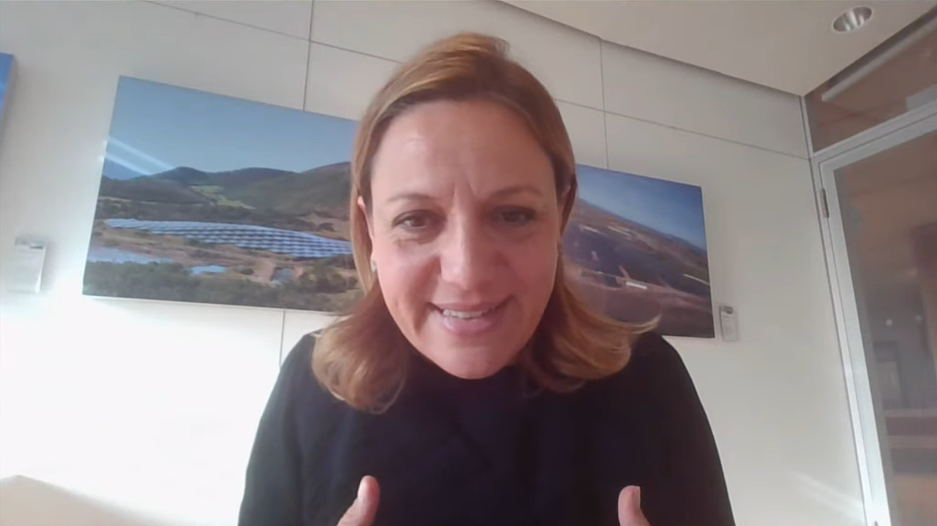
In Romania, we support the country with 1 or 1.5 billion euros every year, but we are not meeting the 50% requirements, yet, because Romania still has some primer investments to be delivered. In the last 18 months, we’ve financed more than 1 billion euros on health projects that are only partially green, meaning that when it comes to the hospitals we work with, we are factoring in the design, we ask the designers to include more energy-efficient solution, more resource efficient solution, to factor in waste recycle or circular economy features.
Last year, we financed 17 billion euros of clean energy all over Europe and only 70 million came to Romania, so we certainly have to accelerate the delivery of new green energy capacity in Romania, but we also need more energy efficient consciousness, meaning that households and industries in Romania need to consume less and better. We have seen a very important shift in the market in the last years, pressured by the increasing energy costs because Romanian businesses benefited from an incredible low energy costs which also made part of their competitiveness in the European market and globally, now this is not going to be the paradigm of the future because the energy costs are increasing.”
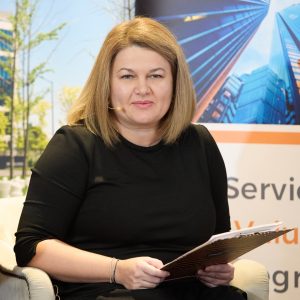
Mioara Iofciulescu, President of Atlantis Romania and VP of OFA UGIR, on the opening of the energy panel: “We have witnessed a global shift towards cleaner and more sustainable energy sources, with Romania being among those nations that are already predisposed to turn wind, solar and hydropower into the backbone of a greener future. We are not only talking about protecting our planet, but also about creating jobs and strengthening energy security.
From the perspective of the World Energy Council, the notion of sustainable energy translates into three main elements: energy security, energy equity and sustainable environment. By harmonizing these three elements will obtain the basis of prosperity and competitiveness at the level of each country”
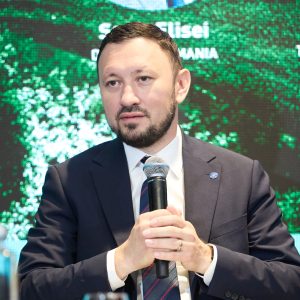
Mircea Fechet, Minister of the Environment: “If we talk about waste management and my soul project, the DRS system in Romania, I always want to participate to discussions, not only to deliver speeches about the importance of the DRS, but also to be sure that I’m in really close contact with all the parties involved. I believe that now before we started, and even after the DRS system started, the dialogue and the real-time feedback have been essential in order for the system to function.
The DRS system will reduce waste and participate to resource conservation. I really care about involving the citizens and that they will know that they will be the ones to make the system work, and we expect the DRS to have an efficiency of over 95%, three years into its implementation. It will not be easy, it’s an issue we’ve been talking about since 2018, a project I created from scratch and I’m really positive.
The DRS system will be implemented starting on the 30th of November and it will be efficient, even though there are a lot of skeptical people. I hope that we will not only have the second largest system in EU, after the German one, but we will be an example of good practice, and maybe, for the first time in so many years, Romania will be an example for other EU states when it comes to managing waste.”
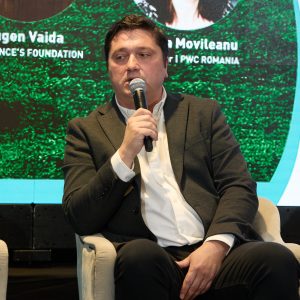
Sorin Elisei, Consulting Director, Deloitte Romania, Leader of the Sustainability Practice: “I would say it is extremely difficult and full of challenges to obtain green financing. Although projects now have technical maturity, they have no financial maturity. In reality, we see this in PNRR that the list of companies that should sign actual financing contracts drop out because they cannot provide the comfort letter, the remaining amount on top of the grant, and this makes the target achievement at the country level a very difficult situation.
More and more of what we see in the market is that companies prefer grants and they don’t like loans which, from a Romanian perspective, is understandable, but that makes it to a certain extent available to large enterprises. This is where we have a sort of kickback from the competition or from the stated perspective where one should know that large enterprises are not the primary focus on the commission’s agenda.
Energy-wise, we still have a market failure today and although we see discussions about how good or bad would be a CFD, we really need to look at the investors and their reasons to invest in Romania, in a sort of ever-changing unpredictable regulatory framework. Financing today, in Romania, is available, from my perspective, for the big ones.”
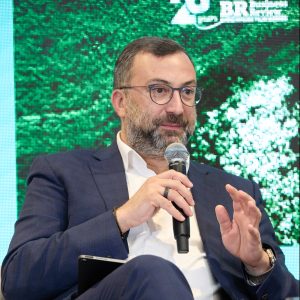
Ionut Georgescu, CEO, FEPRA: “At FEPRA we are managing the project now for IFC (i.e. International Financial Corporation), a financial part of the World Bank, and together with them we tried to help the Romanian Government to make the strategy for economy and the plan more operational and realistic, and explain how to make it work. In Romania, we are very good at strategies, but we are very low on implementing said strategies, and we have two major problems. The first one is the way we are managing the local nation of institutions.
The data from APAFM, from ANPM, from the environment guard, from the Ministry of Environment, and from the Minister of Economy don’t match, although it’s on the same topic. How could we make a strategy realistic and coherent if we start from wrong data? If we make a study, we can convince the European Commission that we have a high reusing level. Circling back to the World Bank and IFC, the second and the largest problem is that the public institution that we have in each strategy don’t have the political willingness and the management desire to implement those strategies, so we have a partner that is not involved, and the level of change in the public institution is so low that we have to wait another 70 years to do something that maybe the private sector could do in two years.”
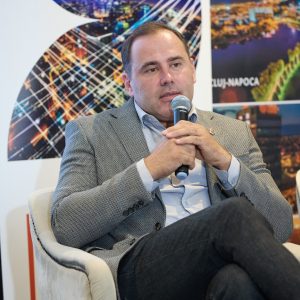
Eugen Vaida, Executive Director for Romania, The Prince’s Foundation: “The Prince’s Foundation in Romania is actually implementing a big part of the vision of His Majesty’s, now King Charles the Third in the UK. Our philosophy is that we learn from the past and we build the future, and we try to reconnect the communities, with their identity, with their self-esteem, and try to make them more aware of what they need to live a healthy life. This is all about diversity and all the things we have done in the past. In construction we have our own containers which are bigger and we restore buildings.
We see very well restored buildings and we say that the most sustainable building is the one that you don’t need to build. This has guided us over the last years, so what we have done is actually try to save Romanian heritage, reuse it, and give it back to the communities. This is why we don’t need to build other buildings, especially since the construction industry is one of the biggest polluters among the textile and food industry. We have worked with the communities and we showed them that the building is their identity, their culture, and we want to put heritage at the core of the climate change action.
The most beautiful project that we’ve done so far is the Prince’s House in Viscri, which is an important project for us. Viscri is one of the most visited UNESCO sites at this moment, in Romania, and the Prince of Wales has a house there, which we opened to the public last year. There you can now find a shop, where we promote traditional products, but also exhibitions about Romanian culture and tradition.”


:quality(80)/business-review.eu/wp-content/uploads/2023/10/Small_NEAN0246.jpg)

:quality(80)/business-review.eu/wp-content/uploads/2024/07/EIB-cohesion.png)



:quality(80)/business-review.eu/wp-content/uploads/2024/06/22C0420_006.jpg)

:quality(80)/business-review.eu/wp-content/uploads/2024/06/COVER-1-4.jpg)



:quality(50)/business-review.eu/wp-content/uploads/2020/07/Radu-Dumitrescu-Deloitte-Romania.jpg)
:quality(50)/business-review.eu/wp-content/uploads/2024/06/dreamstime_xxl_136618819-scaled.jpg)
:quality(50)/business-review.eu/wp-content/uploads/2024/05/BeFunky-collage-99-scaled.jpg)
:quality(80)/business-review.eu/wp-content/uploads/2024/06/br-june-2.jpg)
:quality(50)/business-review.eu/wp-content/uploads/2024/07/VGP-Park-Timisoara_-8thbuilding_iulie-24.jpg)
:quality(50)/business-review.eu/wp-content/uploads/2024/07/America-House-Offices-Bucharest-Fortim-Trusted-Advisors.jpg)
:quality(50)/business-review.eu/wp-content/uploads/2024/07/BeFunky-collage-33-scaled.jpg)